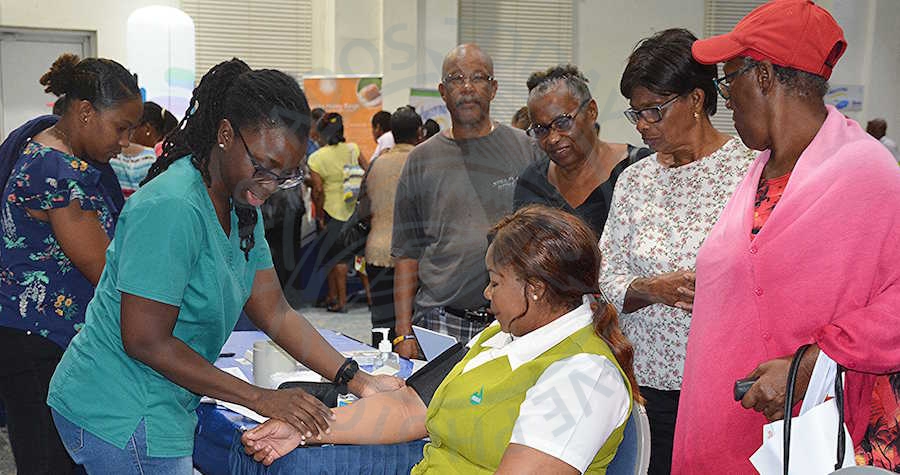 The state of a person’s mental health can play a pivotal role in determining whether he or she becomes a diabetic, and a patient with diabetes is prone to becoming a victim of mental health disorders.
The state of a person’s mental health can play a pivotal role in determining whether he or she becomes a diabetic, and a patient with diabetes is prone to becoming a victim of mental health disorders.
These alarming facts as explained by Dr Tania Whitby-Best point to a disturbing set of circumstances that essentially sandwiches persons along a narrow mental path, deviation from which could lead to contraction of this disease that is already a scourge of the island, with the possibility of bringing on early death.
Whitby-Best has said of mental issues such as bipolar disorder, generalised anxiety disorder, eating disorder, and schizophrenia, that “some of these can cause some form of depression and that can lead to susceptibility to diabetes”.
Addressing a recent National Drug Council-sponsored seminar where the public was invited for free check-ups at the Lloyd Erskine Sandiford Centre, the University of the West Indies, Cave Hill, the medical officer and head of Student Health Clinic said that when a person is affected by bipolar disorder and anxiety “it has been shown that this doubles the prevalence rate of metabolic syndrome, a condition where an individual will have high cholesterol, high blood sugar, high blood pressure and central obesity, an increase in the tummy fat… those factors are also risk factors for diabetes”.
“Some of the anti-psychotic medications can lead to weight gain and then because of this weight gain, obesity, persons can be at risk for diabetes.”
Depression, a condition from which one in eight persons in the general public suffers, is another causal factor for diabetes.
“We know that depression early in life is linked to adverse health behaviour such as lack of physical activity,” the Doctor said.
“Persons may smoke and they could also be at risk for obesity.” There is a clear link between obesity and diabetes.
She spoke of an unpublished study on depression in Barbados reporting on diabetics in a tertiary care clinic as high as 25 per cent.
Added to all this she said, “schizophrenia is noted to be an independent risk factor for diabetes”.
On the other side of the mental health sandwich the body and mind of the person who has already contracted diabetes face other challenges as a result of mental health conditions.
“Diabetes complications are greater among persons who have depression, and the two of them being together in one person increase the odds of disability,” she said.
Disability stemming from diabetes takes on special meaning in Barbados where a study by Dr Errol ‘Mickey’ Waldron has shown an amputation rate that ranks this country the world leader.
“Some studies show that if you have depression in a diabetic the risk of death increases in that person also,” Whitby-Best said.
“Forty percent of individuals with diabetes also suffer from generalised anxiety disorder.”
Eating disorders, anorexia and bulimia nervosa are found to be more common in the Type 1 diabetics she said, but “Type 2 diabetics tend to have binge eating, which is when a person eats so much food in a short period despite not being hungry”.
There is also the ‘Night Eating Syndrome, where “for more than three nights a week someone would get up and eat more than 25 per cent of what should be their caloric intake for the day.”
“Fifty per cent of patients with eating disorders also have depression. So that is a concern when you’re looking at diabetic with depression,” she advised.
The family health doctor stressed the importance of monitoring diabetics for mental health risk, adding “it is important that diabetics know how to maintain good mental health. And for diabetics in our setting, definitely first contact is usually with primary care.”
She reported that the International Diabetes Federation recommends that diabetics be periodically assessed and monitored for depression and any other mental health conditions.
She said such checks could be done easily in a doctor’s office through use of questionnaires.
Additionally, she said, “this is where family can get involved because living with the diabetic person you may be able to pick up earlier anything that might suggest some form of mental health problem.”
Dr Whitby-Best, however, has a precautionary note against misinterpretation of symptoms leading to confusion between a diabetic in need of medication and one with a mental disorder.
“There are some times that a diabetic can have an acute confused state and you need to check their blood sugar first because it could be a low, or very high blood sugar reading. You don’t want to mix that up with being a mental health issue.”




